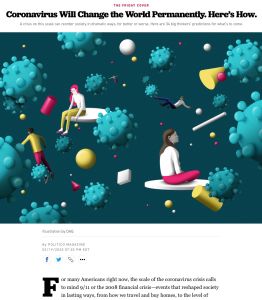Join getAbstract to access the summary!

Join getAbstract to access the summary!
Politico Magazine
Coronavirus Will Change the World Permanently. Here’s How.
A crisis on this scale can reorder society in dramatic ways, for better or worse. Here are 34 big thinkers’ predictions for what’s to come.
Politico Magazine, 2020
What's inside?
As with Sept. 11, 2001 and the 2008 financial crisis, the COVID-19 pandemic will change how people live.
Recommendation
The September 11, 2001 terrorist attacks and the 2008 financial crisis changed how Americans perceive their country and the world. The coronavirus pandemic has quarantined people in their homes, and altered their relationships and how they view the institutions that govern them. As with earlier crises, the coronavirus crisis may change people and US society as a whole in fundamental and lasting ways. No one can predict how this will play out. Politico Magazine asked experts and thinkers for their visions of the future.
Take-Aways
- Difficulties generate opportunities.
- With the coronavirus crisis, intimate personal interactions have become high-risk.
- People will acknowledge that frontline workers are true patriots.
- The coronavirus crisis reveals the limitations of a market-oriented approach to vaccine development.
- The coronavirus crisis may inspire greater respect for institutions.
- The pandemic poses a critical challenge for voting in the upcoming election.
Summary
Difficulties generate opportunities.
The myriad restrictions and deprivations that the coronavirus demands may also offer a range of opportunities. Among them are an increasingly cutting-edge and adaptable relationship with technology; a lessening of barriers among Americans with differing viewpoints; a renewed love for non-urban spaces and a lesson in relishing quieter enjoyment. These experts offer their look ahead:
With the coronavirus crisis, intimate personal interactions have become high-risk.
Most Americans were shocked by the 9/11 attacks and the 2008 financial crisis. Echoing the calamitous 1918 flu pandemic, the coronavirus pandemic will transform how people experience the world and how they act. Suddenly, touching each other or standing near one another has become problematic and even dangerous.
“We know now that touching things, being with other people and breathing the air in an enclosed space can be risky.” ”
Once the crisis passes, how long it will take for life to return to ordinary isn’t clear. People may remain uneasy about shaking hands or hugging and the constant hand-washing habit may endure. People may continue to question the urgency of connecting face to face rather than remotely. (Linguistics professor Deborah Tannen of Georgetown University, author of You Just Don’t Understand and other books.)
People will acknowledge that frontline workers are real patriots.
People tend to associate patriotism with military service and with soldiers deployed in the field. But the people putting themselves in harm’s way in the struggle to mitigate the coronavirus pandemic are not soldiers. They are medical personnel, social workers, and those who keep grocery stores open and basic services running.
“Perhaps, too, we will finally start to understand patriotism more as cultivating the health and life of your community, rather than blowing up someone else’s community.”
As people express gratitude to members of the military for their service, they may come to express similar gratitude to doctors, nurses and the many others who helped those around them survive the pandemic. This may mark a “demilitarization” of US patriotism in which citizens come to regard the people supporting and maintaining the well-being of the community and the nation also as exemplars of patriotism. (Political science professor Mark Lawrence Schrad, author of the forthcoming Smashing the Liquor Machine: The Global History of Prohibition.)
The coronavirus crisis reveals the limitations of a market-oriented approach to vaccine development.
The coronavirus pandemic demonstrates the inherent problems with relying on market incentives for the development of vaccines and treatments for infectious diseases. Although the world experienced outbreaks of strains of the coronavirus over the past two decades, experts still anticipate an 18-month lag before the public gains widespread access to a vaccine. Pharmaceutical companies will simply not step in to curtail a public health crisis unless they know in advance their efforts will be profitable.
“A “more efficient, far more resilient government approach will replace our failed, 40-year experiment with market-based incentives to meet essential health needs.”
The pandemic has proven that the profit motivation is insufficient to meet the public’s basic health requirements. In the end, the investments necessary for the development of vaccines and treatments must come from the government. (Steph Sterling, vice president of advocacy and policy at the Roosevelt Institute.)
The coronavirus crisis may inspire greater respect for institutions.
The experience of seeing how American institutions respond to the coronavirus crisis may inspire people to feel greater respect for these institutions, their values and the important roles they play during a time of crisis.
“Public trust is crucial to governance – and…trust depends on telling the truth.”
The coronavirus crisis may well remind Americans not only of the importance of government institutions, but of the crucial need to staff those institutions with knowledgeable professionals who are capable of making informed, thought-through, far-sighted decisions. (Michiko Kakutani, author of The Death of Truth and former book critic for The New York Times.)
The pandemic poses a critical challenge for voting in the upcoming election.
The coronavirus crisis creates a singular problem that could impede voting in person in the upcoming federal election. Voting itself should never pose a health risk for anyone. To address this, eligible voters should receive ballots in the mail with postage return provided. The government should provide the people who organize the election with the resources they need to deal with the possibility of an unusual number of ballots arriving by mail, which will “become the norm.” (Kevin R. Kosar, vice president of research partnerships at the R. Street Institute.)
[Editor’s note: Coronavirus disease 2019 (COVID-19) is an infectious viral respiratory disease caused by severe acute respiratory syndrome coronavirus 2 (SARS-CoV-2) also known as “novel coronavirus.” The disease was first reported in December 2019, from Wuhan, China, and has since spread globally, resulting in the 2019-20 coronavirus pandemic which affects people and businesses worldwide.]
About the Author
Politico Magazine is an American political opinion magazine founded in 2007.
This document is restricted to personal use only.


















Comment on this summary